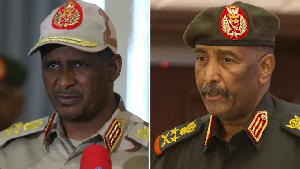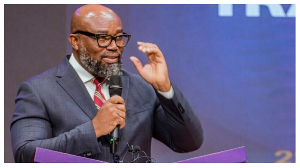Abdul Mohammed, former Chief of Staff for the African Union High-Level Implementation Panel (AUHIP), has warned that the ongoing war in Sudan requires an entirely different approach, as traditional methods of conflict resolution are no longer sufficient.
The Sudan conflict started in April 2023 between the Sudanese Armed Forces (SAF) and the paramilitary Rapid Support Forces (RSF), with more than 20,000 deaths and displacing 12 million people, contrasting it against other humanitarian crises in the world, arguably making this one of the largest.
The fighting has also destroyed infrastructure, including the demolition of hospitals; most are close to being non-operational due to a lack of supplies and financing.
The RSF partially dominates the capital city of Khartoum, while the army controls Omdurman across the Nile. The health system teeters on the brink of a complete collapse as medical staff continue working without salaries but only with small stipends, reports say. Meanwhile, the conflict escalated ethnic violence, especially in places like Darfur, where atrocities have been committed along ethnic lines.
The fighting continues, despite calls for ceasefires and negotiations, while the humanitarian crisis deteriorates further with each passing day. Access to aid is very limited, with millions of civilians beginning to experience food insecurity and lack of health care.
Speaking on Day 3 of the African Peace & Security Dialogue in Johannesburg, organized by the Thabo Mbeki Foundation, Mohammed stressed that a "business as usual" approach will not resolve the crisis in Sudan.
"This particular war of Sudan is like no other war that Sudan has experienced," Mohammed said, pointing out that the conflict threatens the very viability of the state. "Sudan matters. This war has reached a climax—an extreme climax—where the brutal nature of the war and its impact on the people will create a generational crisis."
Mohammed, who has extensive experience in mediating conflicts across Africa, emphasized that the usual political frameworks and templates that have worked in past Sudanese conflicts are no longer sufficient. He noted that, historically, Sudan has settled its wars through negotiations, with no side ever achieving a decisive military victory. However, this time, the stakes are higher, and the consequences are far-reaching.
"The Sudanese elites, who are extremely polarized, are making it difficult to imagine a common future," Mohammed remarked, adding that this polarization has shattered the social fabric of Sudan. He cautioned that attempts to rebuild the country and its institutions will be exceedingly difficult under the current circumstances.
The former AUHIP Chief of Staff called for a rethinking of how African leaders and the international community approach Sudan’s conflict. "Sudanese and the international community, especially Africa, need to approach the Sudan problem not as business as usual. It's not going to work."
In outlining the way forward, Mohammed emphasized the "primacy of politics" over technical solutions in resolving the conflict. He criticized the rising influence of consultants who prioritize technical expertise over political competency, warning that this trend undermines long-term peace. "Technical competency is important, but under the leadership of politics. It should not be done at the expense of politics," he said.
According to Mohammed, a political approach that goes beyond mere ceasefires and power-sharing deals is crucial. He urged the need for a national dialogue that includes the Sudanese people in the peace process, not just the conflicting parties. "National dialogue becomes one of the major instruments of conflict resolution," he explained.
He further warned that polarization is now dismantling politics in Sudan, driven by sectarianism and identity politics. "Polarization demonizes each other, it facilitates the demonization of each other," Mohammed noted, adding that addressing both the violence and the polarization is essential for Sudan to find a path forward.
In closing, Mohammed underscored the urgency of the situation. "The Sudan war is complex, deeply rooted, and now highly internationalized. Therefore, we need to approach this problem with the understanding that the usual approaches will not suffice. The future of Sudan depends on it."
BB
Africa News of Sunday, 6 October 2024
Source: www.ghanaweb.com













